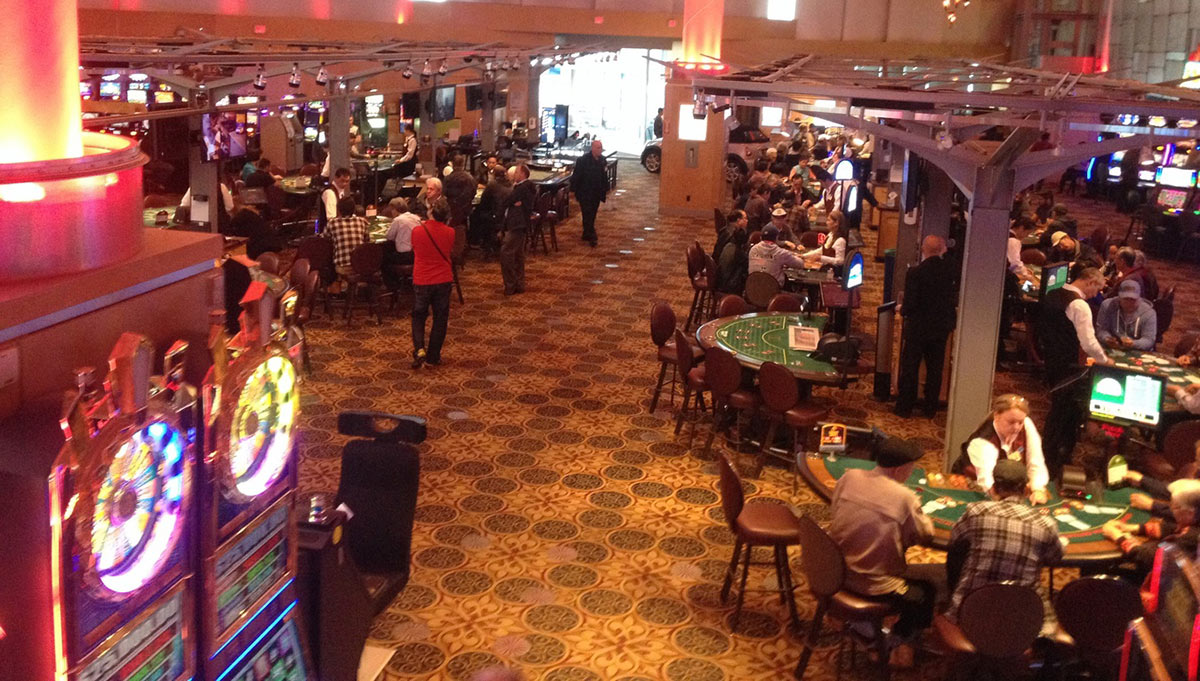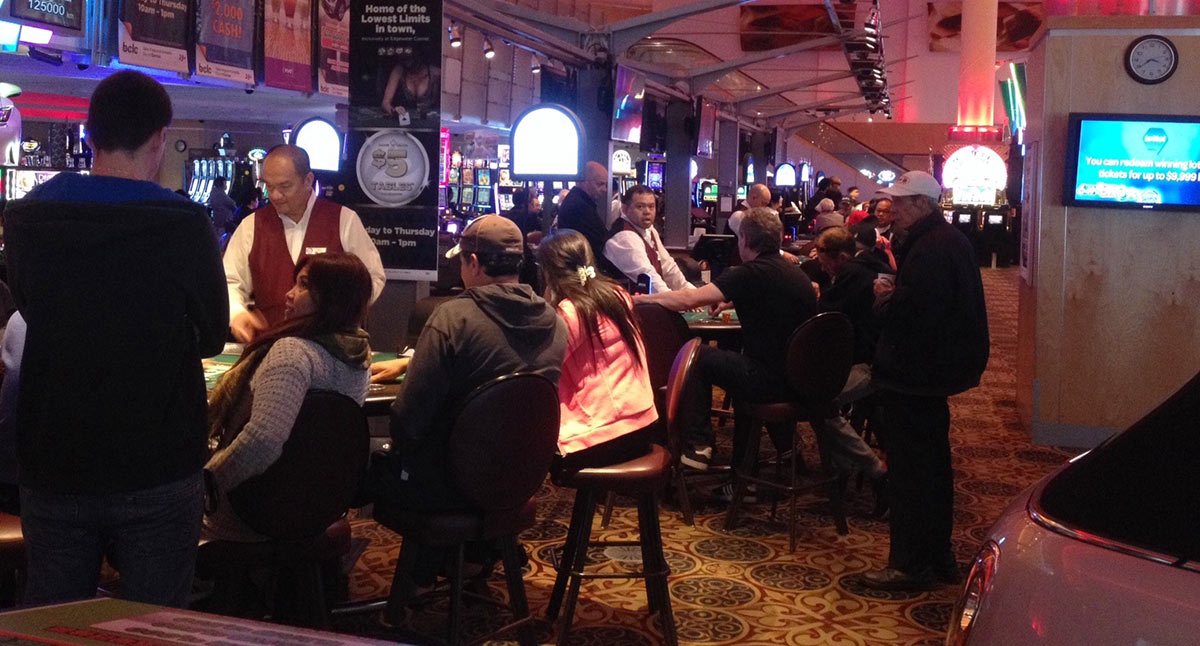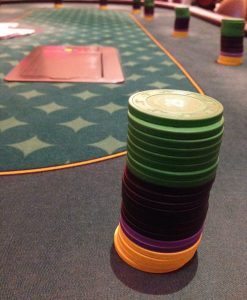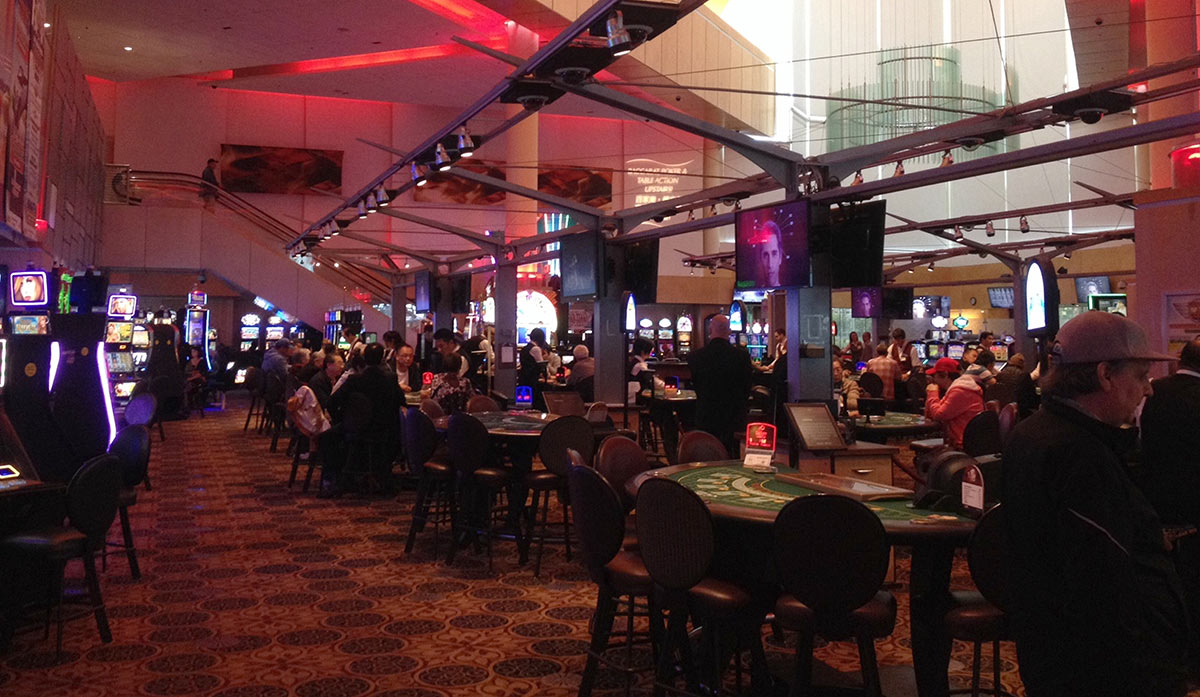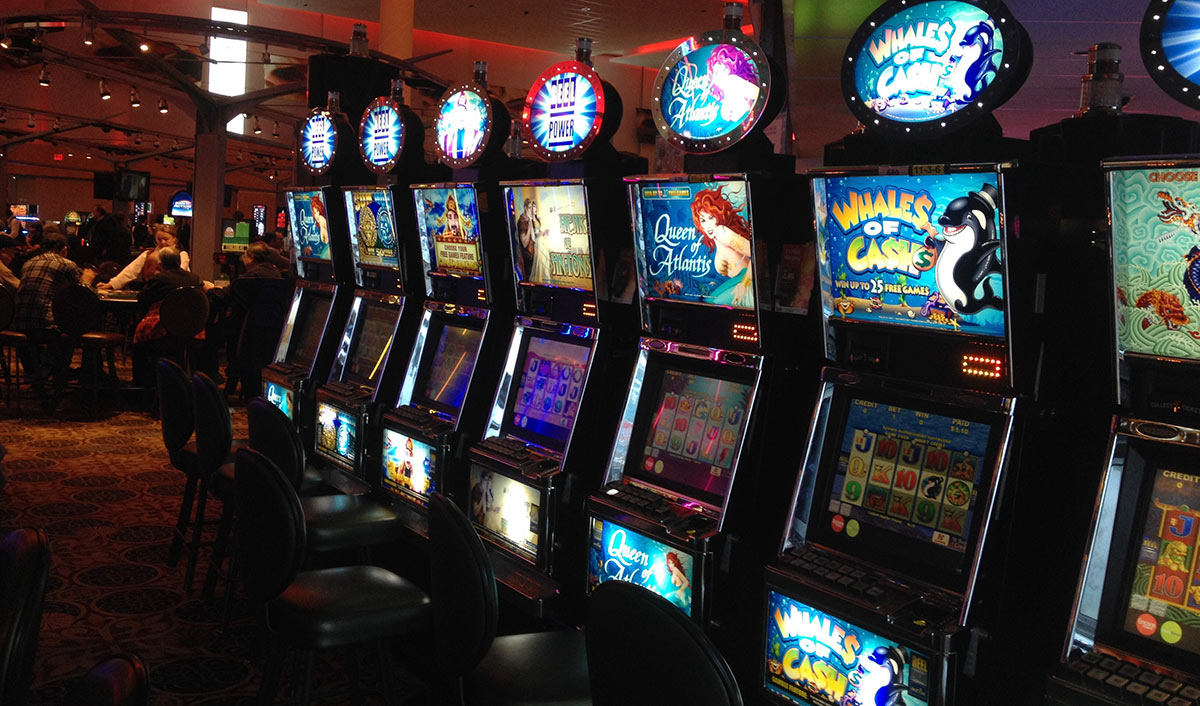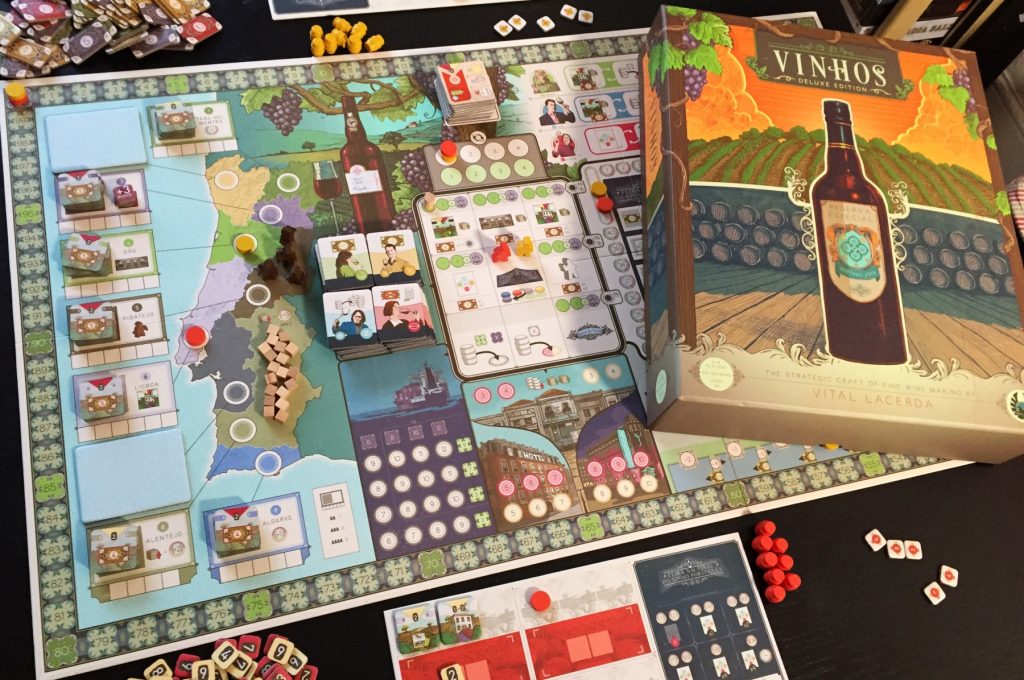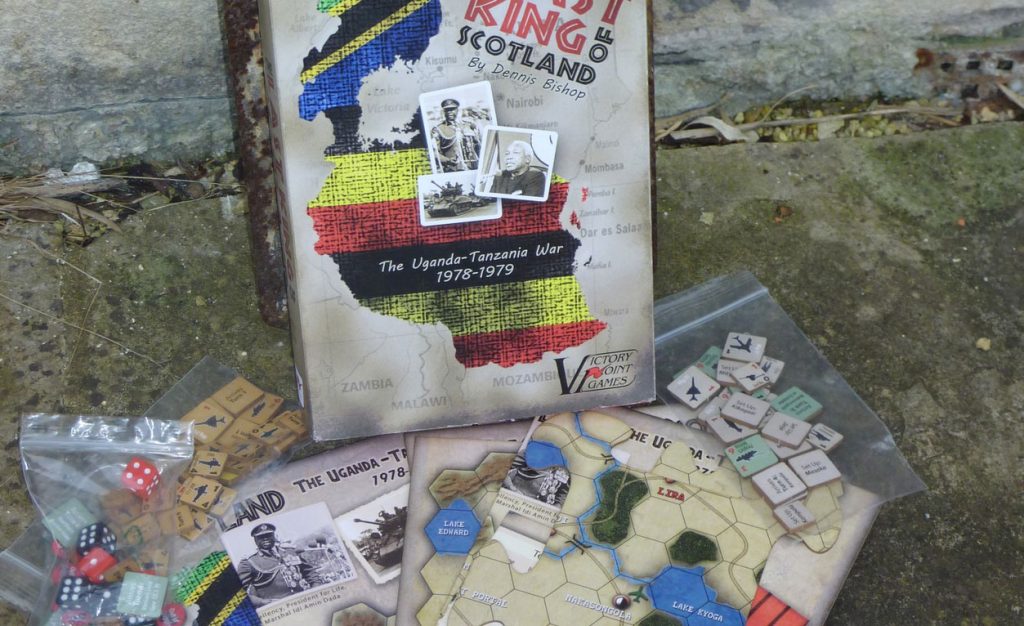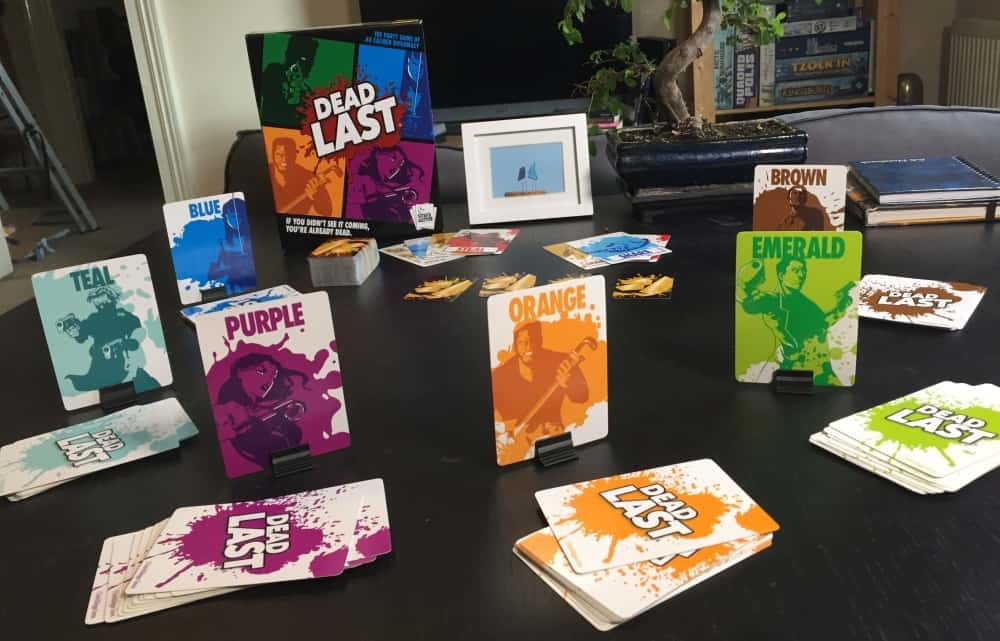Paul: I can’t count the number of chips I have. There are too many.
The croupier has smeared them across the felt toward me and I’m hurriedly scooping up these coloured disks as if they were spilled bonbons. I’m trying to arrange them in piles of five so that I have some idea how much I have, how many I have, except I’ve forgotten to return my cards and now the croupier is reminding me that he needs them before he can deal out the next hand. So I’m now trying to collect my chips, arrange my chips, return my cards and also put in my blind bet. If I was an octopus I could pull this off. Instead, I’m more of a puppy, flailing at my winnings. I must look so clumsy and everybody can see.
The noise was the first thing that got me. Forty-seven people entered this tournament, spread across five tables of ten or nine players. Before the first hand came out there was nothing but the sound of chips clacking. So many chips clacking as dozens of players flipped and fingered and meshed them together like mantis mandibles. I was pretty sure the young man in a black hoodie to my right was good, but I couldn’t quite explain why. Opposite me sat someone who could have just slithered off a Harley Davidson. His face was the greying crags of a cliff. His rings would mangle anybody he swung at. His top was as ragged as his features. His clothes were worn. His cap was worn. His face was worn. His indifference was underlined by a mustache that never, ever moved. He looked like Danny Trejo.
Hello, Danny Trejo, I am English, what what. I weigh less than 130lbs and yesterday I was so tired during my fencing class that I couldn’t hold my sword up.
I have to tell you two very important things. The first is that this won’t be a story of bravado, of macho posturing and of gruff, grizzled sacks of testosterone staring one another down. Perhaps for you that’s what poker seems like. Perhaps for some of the people here, that’s what poker seems like. Those people are going to lose. I am going to watch those people lose. I am going to show you why they lost.
The second thing is that I don’t mind losing but I do so, so hate to disappoint myself. If I don’t think I’ve done my best, if I feel I’ve done something foolish or dumb, I will smoulder. Last night, at fencing, I was angry at myself for performing poorly, for failing to remember things. I don’t care if people beat me, I care if I’m stupid or negligent.
One moment of stupidity or negligence could cost me everything here and I’m struggling to even put things in piles of five. I keep forgetting how much the blind bets have risen to. Sometimes I look up and someone is just staring at me because it’s my turn to bet or to ante or to do something and I’m still thinking about my cards or trying to count to five.
As I look around this table, this first table of several I will sit at as the player pool dwindles, I remember my first visit to this casino, two days before. I was too late to catch a tournament so I played a little on some house tables. “Most of the players up there are grinders,” the woman next to me said. “They turn up and play every day. They know each other. Sometimes they collude. You have to watch out.”
She told me about the wine conference she had just been to and I looked down at the chips I didn’t have, the money leaking out of me like water from a fish tank, giving me less and less room to swim around in.
Both that day and this were Texas Hold ’em, probably the most popular variation of poker now played. You’re dealt two private hole cards that are yours alone. A pool of five more cards is dealt out in the centre of the table, three at first, then another, then another. Before you see any new cards there are rounds of betting where you can raise the stakes, equal them or fold. Your hand is the best combination of five cards from the two you hold and the five in the centre, so ideally you want your hole cards to be as strong as possible. You want to sit on something great and for nobody to know about it until your paws, tentacles or mandibles are scooping all their cash your way.
That day was a bad day and I was extraordinarily lucky. I paid forty Canadian dollars (about £23) to join an open table where up to six players can come and go as they please. Rather than playing together, they only play to beat the house, represented by a dealer who also has their own hand. There’s nothing to stop players colluding, reporting the cards they have to each other to boost everyone else’s chances of making good decision. Worried that the dealer may be holding that ace? The woman from the wine conference just told you she has it. You’re fine.
You’re not fine. That table was stupid. Before I even saw my cards I had to pay $10 just to be dealt in. A quarter of my money right away, a bet on nothing at all. To see cards at the very end I had to pay another $5. The raises I could make as the game unfolded were very structured, meaning I couldn’t go wild if I knew I had a stellar hand.
“Please keep your cards over the table,” was the first thing the croupier there said to me, because I was pawing them to my chest. Too late. Wine Conference Woman had already eyeballed them and was telling me how to play. Within a couple of rounds I’d doubled my money. That was easy, because I just played good cards and avoided bad ones. It was also because the house had to play every hand to the end, no matter how poor it was, because that was its robot-like instruction. It never folded and, as a friend of mine once said “Poker is all about knowing when to fold.”
There was another guy at that table who sat on the far end of it and used a special section of the felt to put down extra blind bets. In addition to placing the requisite $10 before he even saw his cards, he’d sometimes plop down a shiny black $100 chip on a whim. Occasionally, he just felt like risking $100. A few seats down from him, there I am with my molehill of $5 chips, and I am English. I weigh less than 130 pounds.
With its forced bets and structured raises, the table was barely a game. The only control I had was choosing whether to make those very regimented, specific bets, as the table sucked cash out of me hand after hand. That’s how they make their money, I realised, and that wasn’t even the most depressing thing about that day. Gradually, my winnings bled away. Then my $40 bled away. That was a lot less than I saw some people playing for at the many open poker and blackjack tables. Some of them even turned up, slapped down similar amounts on single, big plays and then slunk off, smouldering, with nothing to show for it.
Back in the tournament, I have no idea what I’ve just done. Someone has called out my hand and table number. Showing a queen and a ten, I’ve scored not only a full house but also the best hand of the tournament so far. It appears on the big screen that lords over us all. Is that amazing to me? No. I’m still amazed that, by playing good hand in a careful manner, I’ve actually scored a significant win. I need to rent a snowplough to shift all the chips my way. I stack them up like Scrooge McDuck.
A guy to my right, matted white hair smoothed back, t-shirt hanging off him, asks for a beer. It’s ten thirty in the morning. Pretty soon he’s going to bet all his money, go all in, on a mediocre hand. He’ll lose and then he’ll re-buy, which means he’ll commit more money to stay in the game. This boosts the tournament winnings and effectively counts as an extra life, almost like another player joining in. There will be fifteen re-buys today and so 47 players will play for a prize pool generated by 62 buy-ins.
We all payed $60 (around £33), so the prize pot is $3,720 minus whatever percentage the casino keeps. This time we’re not taking the casino’s money, we’re taking one another’s. We don’t give each other tips based on our cards. Nobody tries to eyeball mine and the most I ever do is carefully bend their edges up toward me, like an anteater tipping a rock.
One time they’re the ace of spades and the seven of clubs. It’s not a great hand with a lot of other players and possibilities around the table, but I don’t have to bet on it because it’s my turn to play the circuit’s Big Blind, the compulsory bet that everyone else will equal or raise. Nobody raises and, as the cards flip out, I’m looking at two more spades. All the cards showing are low cards and if anyone here has half a brain they didn’t make a bet if they had low cards, since low cards are likely to be outranked. Really, they shouldn’t even have played low cards.
In theory.
I don’t do any crazy sums in my head because poker isn’t like the bullshit that is Casino Royale. I don’t need to know the exact odds of winning, I just know that, right now, if more spades appear I could get a flush and, with my ace, the best flush. If an ace appears I’m holding the best pair. There are even outside possibilities of my scoring a straight, five cards in sequence. There’s multiple ways I might win this hand.
Might. So far, I have nothing.
This is the scariest hand of the day because, after my raise, I don’t know the one man left playing against me. I’ve not seen him show many cards or play many other hands. He could be careful. He could be reckless. He could be holding a five and a card that says RULES OF INTERNATIONAL CONTRACT BRIDGE and that will still beat what I currently have. So I try to scare him off.
The next card comes. It’s a spade. We both see there’s three in play now so, when I reach for a tower of chips, he’s had enough. He doesn’t know that there’s something trying to hammer its way out of my chest. There’s no expression on his stubbled, round face as the tsunami that is his money rolls toward me. Because we never see the fifth and final centre card, called the River card, we’ll never know exactly how it would’ve panned out. Perhaps if we’d been more aggressive, more concerned with macho posturing or less restrained acts of bravado, this could’ve gone somewhere else. The thing is, poker is a game that’s all about pushing at just the right moment, not simply pushing all the time. It’s not about unrestrained aggression, it’s about timing.
So I keep telling myself, as my blood pressure mounts.
Chips clack less as more and more cards are spun out toward us. I think about two days ago and the sound of one man’s tapping foot as he woodpeckered at the stool he was sat on. I think about the table service and how everyone here is a concierge of some sort. Beer Guy gets his beer, delivered to his table on a tray. He soon loses everything again and this time he leaves. Someone else joins our table as the remaining players are re-shuffled and amalgamated, all of us occasionally picking up our chip stacks and resettling somewhere else, in some new combination.
I was right about the guy in the black hoodie. He never says anything. Ever. His stack of chips slowly transforms into a teetering chimney, with a vein of blue running through it. Those blue chips have a value of 5,000. Not $5,000, because these chips are all an abstraction of the more modest amounts we’ve invested. 5,000 points, I suppose.
The casino is a timeless place. There’s what you might think are windows up in the wall, but really they’re lights shaped to give the impression of sunlight peeping under a blind. There’s a particular sort of faux-natural brightness in here that is only strange to me because I know it’s overcast outside. The sun always shines indoors.
Somewhere downstairs from us a slot machine pings in ecstasy as it ejaculates hundreds of Canadian coins. Someone has won. The slot machines are the worst, because you feed money into a system whose function and probabilities you probably don’t even understand. Bit by bit, you bleed your cash away. There are people down there who are all adopting the same posture, a posture where they’ve sunk down into their chairs, twisted to one side and raised their feet on a rest. They aren’t playing a game with their money, they aren’t making decisions with it, they’re just pushing buttons to see what might happen to it. Almost all of those buttons, almost all of the time, make the money go away forever. More often than not, anyone playing these machines will lose.
That’s how they make their money.
I doubt that many of the people playing those machines have very much money.
I don’t know how much money is in front of me. Some of it is now those sapphire chips of 5,000 Whatevers. I’m being a jerk with these and hiding them behind lower value chips to mask how much I really have. Having more money than another player gives you leverage. They might commit everything they have on a hand and you might equal that with only a third of your own chips. I don’t want anyone to know I have leverage, much as I don’t want anyone to know when I have good cards. I make gentle, conservative bets or equal other people’s raises before, goodness me, it turns out I had the winning hand all along. In those hands, I hope that people keep playing. I hope not to scare them away. If they keep playing, without any belief I have a strong hand, then they keep betting. That’s how I make my money, little old me, who can barely swing his sword. I weigh less than 130 pounds. How dangerous can I be?
Sometimes I finger my chips as if preparing to bet early. I have a special advantage today that I’ve occasionally almost acted out of turn. It makes me appear somewhere between impulsive and stupid. This is fine. Sometimes I want people to think I’m betting when I’m not, folding when I’m not, because I want them to fold or to continue playing.
There are breaks every hour. We have ten minutes to stretch our legs, empty our bladders or fill our bellies. There’s another guy at my table who, like me, sometimes forgets what the current bet is or makes a small mistake of table etiquette, something like not placing his chips far enough forward or miscounting a raise. I like him. A couple of times he’s nearly out but, by pushing at the right time, he keeps himself in the game, repeatedly turning over hole cards resplendent with royals while his opponents throw their money down on unimpressive pairs. He’s slight, very softly-spoken and can’t be older than twenty-five. His English is a little hesitant but, as we pass each other during a break, he smiles warmly.
I have no idea about any of these people but many of the croupiers and players know each other. They’re on first-name basis. It’s all Marty, Mark, Tommy, Jaz. Two days ago I looked at the slot machines and open tables and was impressed at how even the split was between men and women but here, in this tournament, I only see one woman playing. While I don’t think poker has anything to do with macho maneuvering, some of the other players really do and, suddenly, one of them is staring right at me over the volcano of chips that are our combined bets. Nobody else is in this hand.
“Hi, how’re you doing?” I ask. Because I’m nice.
“GREAT. HOW ARE YOU DOING.” he replies, which is really a question about how good my hand is and how much I might or might not waste either his time or his money. As the tournament progresses, the blind bets gradually increase. If we play quickly, we see more hands at lower blinds. If we dawdle, it costs. I’m dawdling, what what.
I don’t know who he is. He was re-sat right in front of me and all I can tell you about him is that he’s large and grey and glaring. Is this his day off? Does he get up early in the morning to play poker all the time? Is he a grinder, colluding right now to help everyone else surround, pin and bite deeply into my neat stacks of five?
I never learn anything about him except that the his cards were worse than mine and that he didn’t fancy showing them. I don’t need to be strong, I tell myself. Only my cards need to be strong. I’ve won another hand and that volcano spills toward me. Pyroclastic flow. Poker plastic flow.
I swear to God that I don’t understand how everyone else here has so few chips. Danny Trejo is gone and all those deep wrinkles, those spiky rings, those passionless stares have done nothing for him. That guy in the black hoodie, though, he says nothing, shows nothing and continues to build a Tolkienesque tower of power that’s threatening to brush his chin.
I don’t know if I like this place. Everyone serving asks my name. Everyone is extremely friendly. Everyone offers to help. Everyone remembers my name. Nobody talks about money.
About halfway through the tournament someone who I think is a pretty good player gives me a strong challenge. Like so many of the people here, I guess he’s about fifty. He looks weary. I turned up in a shirt and good shoes, keen to look as smart as possible, but a lot of people here have tattered clothes and tattered faces. His bets force me to either go all in or to bail on what was already a pretty big investment of chips. Again, I’m holding a queen and there are two more laid out in front of me. I go for it.
With nothing left to bet we both shows our cards. He has the other queen, but the second card I’m holding is, again, a ten. His second is a nine. My hand is incrementally better than his and that tiny sliver of probability is the difference between total loss and a tremendous gain.
I am also exhausted. I have no idea how many people are left on the other tables. I have no idea how long it’s been. Three hours? Three hours of my brain being constantly switched on and not only evaluating every deal I get, but also evaluating everyone else around me, trying to understand which players are the most aggressive, which are the wisest. The ones to pounce on are those who throw a lot of money at bad cards, who hold something like a low pair but hurl their money forward in the hope of ramming everyone else aside. Sometimes they massively over-bet, putting more money forward than is currently in the pot. “I am so confident that I want to bet even more money than is currently in play,” that says.
Most of these players have been scalped by now. A few by that guy in black.
Everything about him says neatness. His hair falls just right. His speech is clipped. There are no wrinkles, no smiles, no frowns, no hesitations and never any misunderstandings. Nobody knows his name and he barely says a word. Beside him now is a man who speculates about the possibility of every play, congratulating others and berating himself. From within his huge, dark beard come comments on all the other ways that the previous hand just might have gone.
There is another break and we move tables. I realise, now, that this is the last table. This is the last of us. The final ten and, while I recognise most of the faces around me from other rotations or minglings, one of these men is new. He has neat, white hair, horn-rimmed glasses and the look of a university professor who thoroughly enjoyed the nineteen-sixties. He is old.
I will never, ever see him lose a hand.
I am about to make some money. The circle has closed so much that there’s no way I cannot walk away from this table with at least something in winnings. I am also in the only part of the casino where this was ever really likely and now I’m thinking about how that $60, that £33 that I’d written off as a likely loss, was once a tremendous amount of money to me. I am thinking about how I’ll write this story and about how I’ll tell you all not to go to casinos, to gamble with money, to do what I’m doing now.
Ten years ago I used poker winnings to pay my rent. I only did it once or twice because I didn’t win very much. I used to play poker online for tiny, tiny amounts of money, that same friend of mine reminding me about the importance of folding, of knowing when to give up. It was a hard lesson to learn because I hate to give up. Losing isn’t how I disappoint myself. Giving up is.
She shepherded me through stupid hands and stupid plays. She told me to never bet money I couldn’t afford to lose and to write off that money as a loss the moment I took it to the table. You never gamble with anything you care about or anything you need. No matter how good you are, there’s always the element of chance. You mitigate it as much as you can with experience and sensible decisions. You play at tables with bet limits small enough that your pool as a whole shouldn’t be seriously affected by any big loss or dumb error.
I haven’t made any dumb errors yet, but I want to collapse, face-first into the table. My brain has been buzzing at the expense of my flailing puppy paws, which still fail to understand how to just handle physical objects. Some beefy, sun-worn and sunglassed guy to my left has just gone all in and it’s a single blue chip off my gigantic stack to match him. He has what’s called a pocket pair, two matching cards in his hole, but they’re only sixes. My king and ten give me six other cards that could make higher pairs than him, or I could possibly even form a straight if chance fills in the gaps. The only thing that will help him right now is one of the other two sixes in the deck, a three-of-a-kind beating any pairs I make, though not trumping that possible straight.
Nothing dramatic happens. A single king appears. That’s enough. He’s gone. On a table full of players there are going to be ten pairs of hole cards plus five showing in the centre. Half of the deck will be in play and are likely to be lots of ways for lots of people to beat him. It was a poor move. The most manly-looking person left is now gone.
I wonder what my face looks like to the remaining players, if they can see my fatigue or if they have any judgment about my less-than-130-pound-what-what-Englishness now. I wonder if they realise that I’m still amazed by the card-shuffling machine that is built into this table, a black pit of mystery into which cards disappear before being regurgitated from its depths in a new combination. I’m amazed until the thing breaks, anyway. A guy in a suit appears, tears the whole contraption out and simply slots another one in.
I reckon a lot of the people in here are poor, scratching away at those slot machines, clawing at the meagre handfuls of coins that drip out now and then, always a little less than what they fed in. I think about how what must now be four hours of poker is something I’ve bought for $60. Was that good value for money? Will I think different when I see whatever profits I’ve made? Do these people around me see this game as a good way to use their time, their money, their mental energy? Is $60 much to them?
I knock another guy out. I apologise, but he doesn’t seem remotely bothered. Still, I don’t much like the feeling. I’m not sure I like the feeling of winning, only of making wise moves. Some of those wise moves involve throwing cards away, letting my bets go rather than making questionable fights for them. I do this even though my funds are dwindling. The blind bets are climbing up and after initially paying tiny amounts like 25 or 50, the hours have seen them grow to 6,000. Every circuit of the table no longer shaves at my stack, but slices into it like a knife into a cake, cutting away another portion.
When I lose it’s to the guy right next to me, the most talkative guy here. I know at least a little about him. He has a daughter. She wants to watch the FIFA Women’s World Cup here in Vancouver. She plays herself, but he’d prefer she swims as he doesn’t think “soccer” is a sport for girls. Like several of the players here, he often has headphones in his ears and he has to pluck them out whenever people repeat things at him.
He also has a low pocket pair. It beats the king and queen I held, which never find their like, never help form a straight, nor help make a flush. At this point, with only six people left at the table, less powerful hands become increasingly potent. His play was a little risky, but it doesn’t seem unwise to me and I don’t much feel mine was either. I am also mentally and physically shot and happy to step out of a game in which, somehow, fatigue and occasional fear didn’t force me to make any foolish plays.
It also doesn’t hurt when the cashier passes me $105. I guess I earned about ten bucks an hour, that’s one way to look at it. Ten bucks an hour for being very prudent and a little lucky. Prudent and lucky. Plucky. English, under 130 pounds and plucky, what what.
I could stick around to see who in that final five wins, as it would be an interesting game. The young man in black leads. The white-haired professor is, I now realise, amiable, disarming and absolutely deadly. Soccer Dad congratulates me on some good play. The guy I like, all quiet smiles and polite praise, is still in. I hope he gets it. I doubt he will.
Still, even if he drops out next he’ll win double what I just did.
But I’m out of there. Years of playing poker teaches me that, today, I was still pretty lucky. It also reminds me that winning at poker requires a massive investment of time and energy, both of which are very limited currencies for many of us. I don’t even want to look at those rows and rows of slot machines, nor those many open tables with their stupid custom rules. There’s even a roulette table, that disgusting thing that lets you can bet money on where bouncing ball may may finally land. I’m quite sure some of these clients can’t afford to do things like that, clients like the very first man I saw leaving as I stepped in, slouching downtrodden and defeated. I’m also quite sure some others, like the man betting $100 on thin air, don’t care. That’s just how he spends his downtime.
That ambivalence saddens me. Throwing money at luck saddens me. It saddens me that, for all the people we had in our tournament, most of the visitors here are playing things that are designed to make them lose money, designed to make them slowly drip their cash into casino coffers so vast that this place can afford to constantly offer free cruises, free cars, free money to anyone lucky enough to win a twice-weekly twist of a tombola.
This isn’t a place that’s interested in its clients being savvy. Coming here, playing here, being part of this, that’s not something that makes me feel like a winner, more like a survivor. Not just a survivor of this place, a survivor of the poverty that parts of it remind me of, something that still stares at me from the rear view mirror. Nobody I beat seemed all that bothered that I took their money away from them and perhaps they can more than afford it, perhaps they’ve done this a thousand times, but I didn’t gain any satisfaction.
What sticks with me most now is a few select memories. Pushing that ace of spades. Fumbling uncountable chips. A face, darkened by a baseball cap, intoning “GREAT. HOW ARE YOU DOING.” Most of all, though, it’s something outside of the tournament.
There was an old woman at a slot machine downstairs on the first day I visited who won big. There was a loud noise and, like a row of mechanical marionettes, the heads on every other player in the place immediately swiveled in her direction. After she had finished scooping out the silvery slurry gifted to her by fate, she immediately began pouring it back into the same machine, like an ocean evaporating its waters back to the sky.
You know what? I don’t want you to come here. I don’t much want you to play poker. I don’t want you to play with money or for money, because it takes a lot of time and energy to get good at that and I don’t know how much it’s worth and also because there are other ways to spend your money, spend your energy, spend your life. Maybe try fencing or something.
Paul spent $60 of SU&SD’s money to join the tournament and will be donating his winnings to a local poverty relief organisation at the end of the month. He spent $40 of his own money during his first visit and feels mild regret about this.

